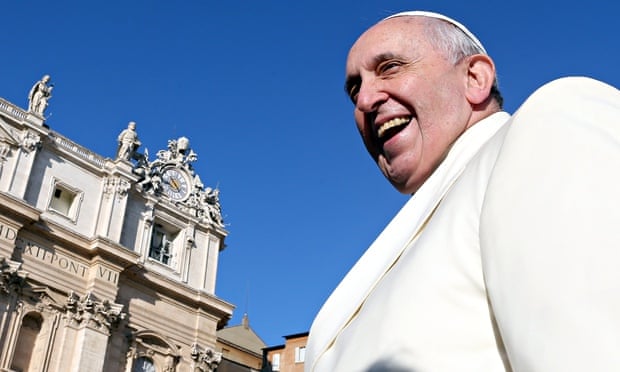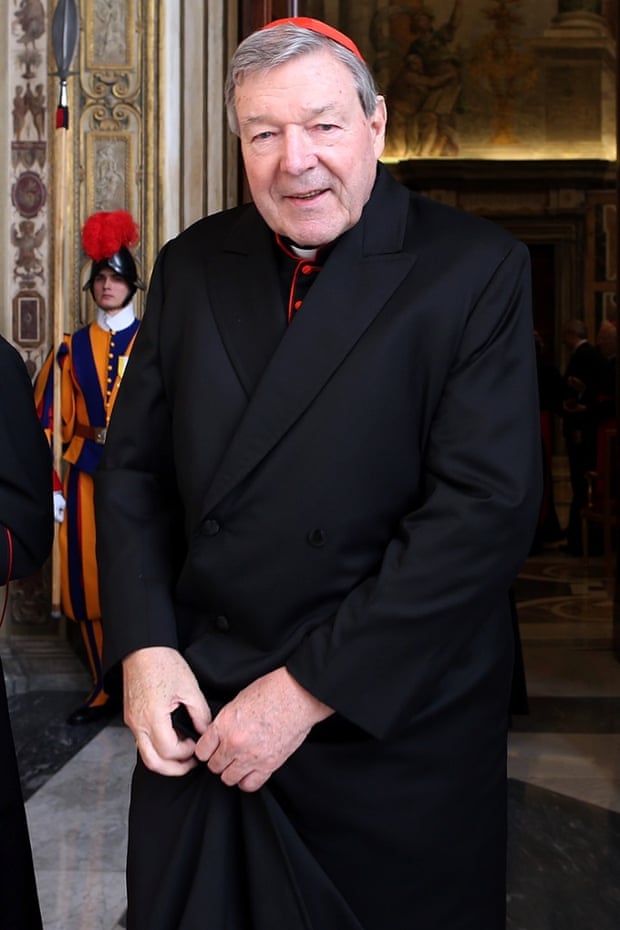Pope Francis’s edict on climate change will anger deniers and US churches
Pontiff hopes to inspire action at next year’s UN meeting in Paris in December after visits to Philippines and New York

Pope Francis was a key player in thawing relations between the US and Cuba. Photograph: Franco Origlia/Getty Images
He has been called the “superman pope”, and it would be hard to deny
that Pope Francis has had a good December. Cited by President Barack
Obama as a key player in the thawing relations between the US and Cuba, the Argentinian pontiff followed that by lecturing his cardinals on the need to clean up Vatican politics. But can Francis achieve a feat that has so far eluded secular powers and inspire decisive action on climate change?
It looks as if he will give it a go. In 2015, the pope will issue a
lengthy message on the subject to the world’s 1.2 billion Catholics,
give an address to the UN general assembly and call a summit of the
world’s main religions.
The
reason for such frenetic activity, says Bishop Marcelo Sorondo,
chancellor of the Vatican’s Pontifical Academy of Sciences, is the
pope’s wish to directly influence next year’s crucial UN climate meeting in Paris, when countries will try to conclude 20 years of fraught negotiations with a universal commitment to reduce emissions.
“Our academics supported the pope’s initiative to influence next year’s crucial decisions,” Sorondo told Cafod,
the Catholic development agency, at a meeting in London. “The idea is
to convene a meeting with leaders of the main religions to make all
people aware of the state of our climate and the tragedy of social
exclusion.”
Following a visit in March to Tacloban, the Philippine city
devastated in 2012 by typhoon Haiyan, the pope will publish a rare
encyclical on climate change and human ecology. Urging all Catholics to
take action on moral and scientific grounds, the document will be sent
to the world’s 5,000 Catholic bishops and 400,000 priests, who will
distribute it to parishioners.
According to Vatican insiders, Francis will meet other faith leaders and lobby politicians at the general assembly in New York in September, when countries will sign up to new anti-poverty and environmental goals.
In recent months, the pope has argued for a radical new financial and
economic system to avoid human inequality and ecological devastation.
In October he told a meeting of Latin American and Asian landless
peasants and other social movements: “An economic system centred on the
god of money needs to plunder nature to sustain the frenetic rhythm of
consumption that is inherent to it.
“The
system continues unchanged, since what dominates are the dynamics of an
economy and a finance that are lacking in ethics. It is no longer man
who commands, but money. Cash commands.
“The monopolising of lands, deforestation, the appropriation of
water, inadequate agro-toxics are some of the evils that tear man from
the land of his birth. Climate change,
the loss of biodiversity and deforestation are already showing their
devastating effects in the great cataclysms we witness,” he said.
In Lima last month, bishops from every continent expressed their
frustration with the stalled climate talks and, for the first time,
urged rich countries to act.
Sorondo, a fellow Argentinian who is known to be close to Pope Francis,
said: “Just as humanity confronted revolutionary change in the 19th
century at the time of industrialisation, today we have changed the
natural environment so much. If current trends continue, the century
will witness unprecedented climate change and destruction of the
ecosystem with tragic consequences.”
According to Neil Thorns, head of advocacy at Cafod, said: “The
anticipation around Pope Francis’s forthcoming encyclical is
unprecedented. We have seen thousands of our supporters commit to making
sure their MPs know climate change is affecting the poorest
communities.”
However, Francis’s environmental radicalism is likely to attract
resistance from Vatican conservatives and in rightwing church circles,
particularly in the US – where Catholic climate sceptics also include
John Boehner, Republican leader of the House of Representatives and Rick
Santorum, the former Republican presidential candidate.
Cardinal George Pell, a former archbishop of Sydney who has been
placed in charge of the Vatican’s budget, is a climate change sceptic
who has been criticised for claiming that global warming has ceased and
that if carbon dioxide in the atmosphere were doubled, then “plants
would love it”.

Former Archbishop of Sydney,
Cardinal George Pell, arrives at the Vatican to exchange Christmas
greetings with Pope Francis on 22 December, 2014.
Photograph: Franco Origlia/Getty Images
Dan Misleh, director of the Catholic climate covenant, said: “There
will always be 5-10% of people who will take offence. They are very
vocal and have political clout. This encyclical will threaten some
people and bring joy to others. The arguments are around economics and
science rather than morality.
“A papal encyclical is rare. It is among the highest levels of a
pope’s authority. It will be 50 to 60 pages long; it’s a big deal. But
there is a contingent of Catholics here who say he should not be getting
involved in political issues, that he is outside his expertise.”
Francis will also be opposed by the powerful US evangelical movement,
said Calvin Beisner, spokesman for the conservative Cornwall Alliance
for the Stewardship of Creation, which has declared the US environmental
movement to be “un-biblical” and a false religion.
“The pope should back off,” he said. “The Catholic church is correct
on the ethical principles but has been misled on the science. It follows
that the policies the Vatican is promoting are incorrect. Our position
reflects the views of millions of evangelical Christians in the US.”

No comments:
Post a Comment